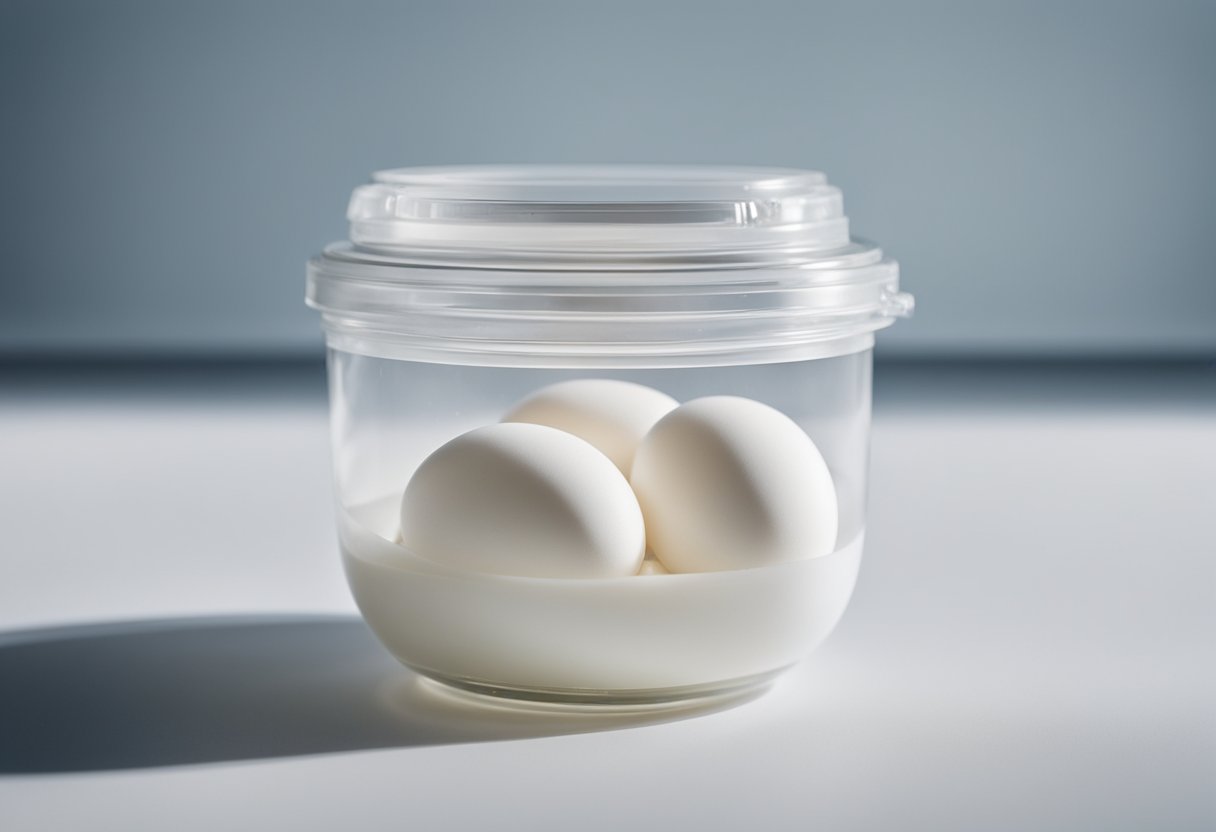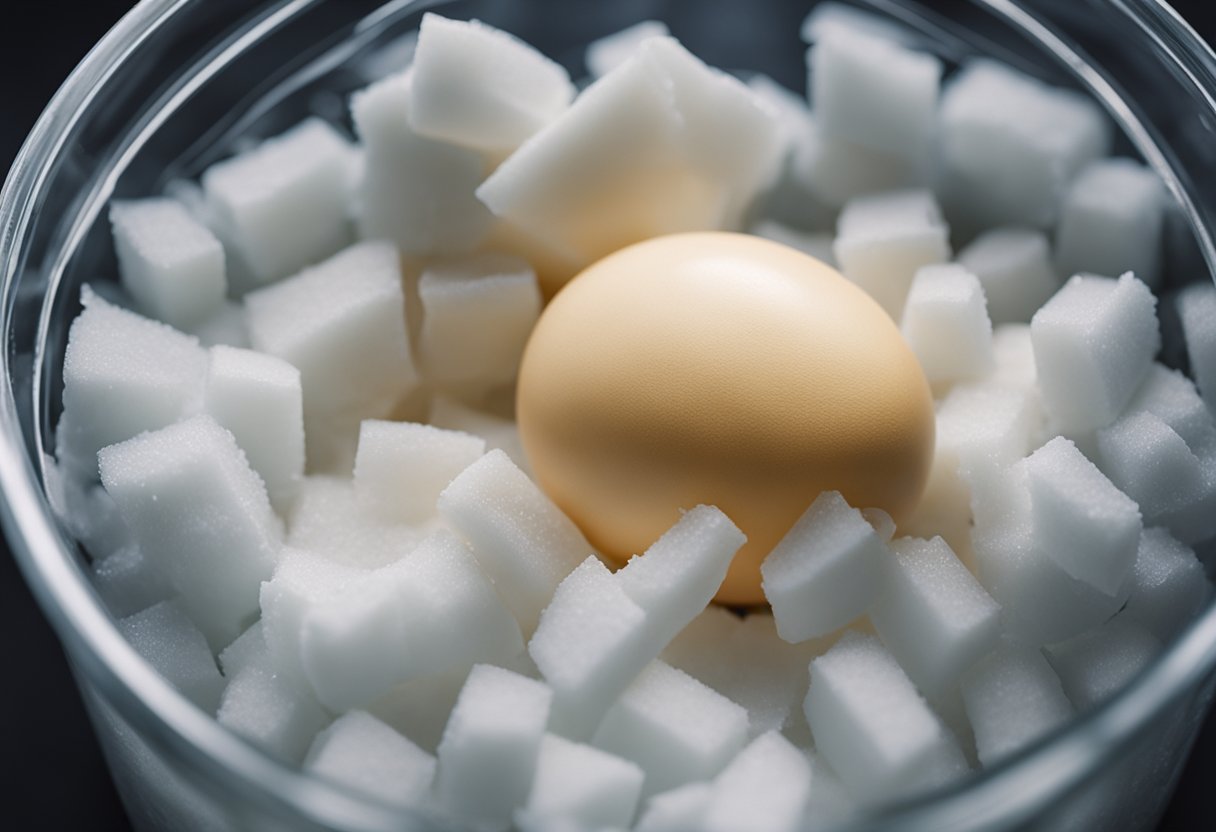Can you freeze cooked egg whites? This is a question that many people ask themselves when they have leftover egg whites from a recipe.
The answer is yes, you can freeze cooked egg whites, but it is not the best method of storing them. Fresh egg whites freeze much better than cooked ones do.
This is because cooked egg whites will turn quite rubbery when stored in the freezer.

To freeze cooked egg whites, you will need to follow a step-by-step guide. First, you should allow the egg whites to cool completely before freezing them.
Once they are cool, you can transfer them to an airtight container or freezer bag. Be sure to label the container or bag with the date so that you can keep track of how long they have been in the freezer.
When it comes time to use your frozen cooked egg whites, you will need to thaw and reheat them properly. This can be done by placing them in the refrigerator overnight or by using the defrost setting on your microwave.
Once they are thawed, you can reheat them in a skillet or in the microwave. It is important to note that frozen cooked egg whites may not have the same texture as fresh ones, but they can still be used in recipes like omelets, quiches, and frittatas.
Key Takeaways
- Cooked egg whites can be frozen, but fresh egg whites freeze better.
- Follow a step-by-step guide to freeze cooked egg whites and label them with the date.
- Thaw and reheat cooked egg whites properly before using them in recipes.
Understanding Egg Whites and Freezing
The Nature of Egg Whites
Egg whites are a great source of protein and are commonly used in various recipes. They are also a popular ingredient for those who are health-conscious and want to reduce their fat intake.
Egg whites consist of about 90% water and 10% protein, which makes them an ideal candidate for freezing.
When it comes to freezing egg whites, it is important to note that they can be frozen in both raw and cooked forms.
However, it is recommended to freeze raw egg whites as they tend to freeze better than cooked egg whites. Raw egg whites can be frozen for up to 12 months while cooked egg whites can be frozen for up to 3 months.
The Science of Freezing
Freezing egg whites is a simple process. First, separate the egg whites from the yolks and pour them into a freezer-safe container.
You can also use ice cube trays to freeze individual portions of egg whites. If you are using ice cube trays, make sure to spray them with non-stick cooking spray before pouring in the egg whites.
Once you have poured the egg whites into the container or ice cube tray, cover it tightly with a lid or plastic wrap. Label the container with the date and the number of egg whites in the container.
This will help you keep track of how long the egg whites have been frozen and how many you have left.
It is important to note that raw eggs should never be frozen in their shells. This is because the water content in the egg expands when frozen, which can cause the shell to crack and allow bacteria to enter the egg.
Pasteurized eggs, which have been treated to kill any harmful bacteria, can be frozen in their shells.
In addition to freezing egg whites, you can also freeze whole eggs and egg yolks.
However, it is important to note that whole eggs should be beaten before freezing, and egg yolks should be mixed with either salt or sugar before freezing to prevent them from becoming too thick.
Overall, freezing egg whites is a great way to extend their shelf life and reduce food waste.
Whether you are meal prepping or just have extra egg whites, freezing them is a simple and effective way to ensure that you always have them on hand when you need them.
Freezing Cooked Egg Whites: A Step-by-Step Guide
Preparation
When it comes to freezing cooked egg whites, preparation is key. First, make sure that the egg whites are fully cooked before freezing them. Once cooked, allow them to cool to room temperature before proceeding.
Next, you’ll want to portion out the egg whites into a container that is suitable for freezing. One option is to use an ice cube tray.
Simply pour the egg whites into the tray and freeze until solid. Once frozen, transfer the egg white cubes to a freezer-safe container or plastic bag.
Freezing
To freeze cooked egg whites, place them in a freezer-safe container or plastic bag. Be sure to label the container or bag with the date and number of egg whites inside.
This will help you keep track of how long they have been frozen and how many you have left.
If using an ice cube tray, transfer the frozen egg white cubes to a freezer-safe container or plastic bag. Again, be sure to label the container or bag with the date and number of egg white cubes inside.
Storage
Cooked egg whites can be stored in the freezer for up to one year. When you’re ready to use them, simply thaw them in the refrigerator overnight.
They can also be thawed more quickly by placing the container or bag in a bowl of cold water.
Once thawed, cooked egg whites can be used in a variety of recipes, such as omelets, frittatas, and quiches. They can also be scrambled or used as a protein-packed addition to salads.
In conclusion, freezing cooked egg whites is a simple and convenient way to extend their shelf life. By following these steps, you can ensure that your egg whites stay fresh and ready to use whenever you need them.
Thawing and Reheating Cooked Egg Whites
When it comes to using frozen cooked egg whites, it is important to thaw and reheat them properly to maintain their texture and flavor.
In this section, I will cover the best methods for thawing and reheating cooked egg whites.
Thawing Process
There are three safe ways to thaw cooked egg whites: in the refrigerator, at room temperature, and in cold water. The best method will depend on how much time you have and when you plan to use the egg whites.
If you have time, thawing in the refrigerator is the safest method. Simply transfer the frozen egg whites from the freezer to the refrigerator and allow them to thaw overnight or for at least 12 hours.
This will ensure that the egg whites thaw evenly and safely.
If you need to thaw the egg whites quickly, you can use the cold water method. Place the frozen egg whites in a sealed plastic bag and submerge it in cold water.
Change the water every 30 minutes until the egg whites are thawed. This method should take about 1-2 hours, depending on the amount of egg whites.
If you are in a rush, you can also thaw the egg whites at room temperature. Simply place the frozen egg whites on the counter and allow them to thaw for about 30 minutes to an hour.
However, this method is not recommended as it increases the risk of bacterial growth.
Reheating Method
Once the egg whites are thawed, you can reheat them using a variety of methods. The best method will depend on how you plan to use them.
If you are using the egg whites in a recipe that requires them to be cooked, such as an omelet or frittata, you can add them directly to the recipe and cook as directed.
If you want to reheat the egg whites on their own, the microwave is the quickest and easiest method. Place the egg whites in a microwave-safe dish and heat on high for 30 seconds.
Stir the egg whites and heat for an additional 15-30 seconds, or until heated through.
Alternatively, you can reheat the egg whites on the stovetop. Heat a non-stick skillet over medium heat and add the egg whites. Cook for 1-2 minutes, stirring occasionally, or until heated through.
It is important to note that once cooked egg whites have been frozen and thawed, they may release more liquid than fresh egg whites. This is normal and can be easily drained off before reheating.
In summary, thawing and reheating cooked egg whites is a simple process that can be done safely and quickly using the methods outlined above.
Whether you choose to thaw in the refrigerator, at room temperature, or in cold water, and reheat in the microwave or on the stovetop, following these guidelines will ensure that your egg whites are safe and delicious to eat.
Impact of Freezing on Egg Whites

As someone who loves to cook, I often find myself with leftover ingredients that I’m not sure what to do with. One such ingredient is egg whites.
While it’s common to freeze fresh egg whites, I’ve often wondered if it’s possible to freeze cooked egg whites as well. In this section, I’ll explore the impact of freezing on egg whites.
Texture and Flavor
According to EatingWell, cooked egg whites should be avoided when it comes to freezing. This is because they tend to develop a rubbery texture once frozen and thawed.
The texture change occurs because the freezing process causes ice crystals to form, which can damage the delicate protein structure of the egg whites.
In addition to the texture change, freezing can also affect the flavor of cooked egg whites. Freezing can cause the egg whites to absorb flavors from other foods in the freezer, which can alter their taste.
This can be especially problematic if you plan on using the egg whites in a recipe where their flavor plays a key role.
Nutritional Value
When it comes to the nutritional value of frozen cooked egg whites, there isn’t much difference compared to fresh cooked egg whites.
Freezing does not significantly alter the nutrient content of the egg whites, so you can still enjoy their protein-rich goodness even after they’ve been frozen.
However, it’s important to note that the shell of the egg contains a membrane that helps protect the egg from bacteria. When you cook the egg, the membrane becomes less effective at protecting the egg.
This means that cooked egg whites are more susceptible to bacterial growth than fresh egg whites. If you do decide to freeze cooked egg whites, it’s important to make sure they are stored properly and used within a reasonable amount of time to avoid any potential foodborne illness.
Overall, while it is technically possible to freeze cooked egg whites, the resulting texture and flavor changes make it less than ideal.
If you find yourself with leftover cooked egg whites, it’s best to use them up as soon as possible rather than freezing them.
Using Frozen Cooked Egg Whites

When it comes to using frozen cooked egg whites, there are a few things to keep in mind. While freezing cooked egg whites is possible, it’s not always the preferred method of storing egg whites overall.
Fresh egg whites freeze much better than cooked ones do. This is because cooked egg whites will turn quite rubbery when stored in the freezer.
However, if you have leftover cooked egg whites and don’t want to waste them, freezing them is a great option.
In Baking
Frozen cooked egg whites can be used in baking recipes that call for egg whites. Thaw the egg whites in the fridge overnight or at room temperature for a few hours before using them in your recipe.
You can also thaw them in the microwave, but be sure to do so in short intervals to avoid cooking them further. Once thawed, you can use them in recipes such as muffins, quiche, cookies, cakes, and more.
In Breakfast Dishes
Frozen cooked egg whites are a great option for meal prepping breakfast dishes. You can use them in recipes such as frittatas, egg sandwiches, egg casseroles, and breakfast egg muffins.
Thaw the egg whites in the fridge overnight or at room temperature for a few hours before using them in your recipe.
You can also thaw them in the microwave, but be sure to do so in short intervals to avoid cooking them further.
In Desserts
Frozen cooked egg whites can be used in desserts that call for egg whites, such as macarons, soufflés, meringue, and royal icing.
Thaw the egg whites in the fridge overnight or at room temperature for a few hours before using them in your recipe.
You can also thaw them in the microwave, but be sure to do so in short intervals to avoid cooking them further.
In Cocktails
Frozen cooked egg whites can also be used in cocktails that call for egg whites, such as whiskey sours and gin fizzes.
Thaw the egg whites in the fridge overnight or at room temperature for a few hours before using them in your cocktail.
You can also thaw them in the microwave, but be sure to do so in short intervals to avoid cooking them further.
Overall, frozen cooked egg whites are a great way to reduce food waste and make meal prep easier. Just remember to thaw them properly before using them in your recipe, and be aware that they may not have the same texture as fresh egg whites.
Food Safety Considerations

When it comes to freezing cooked egg whites, it is important to consider food safety. Improperly stored or handled eggs can lead to foodborne illness, which can cause serious health problems.
Therefore, it is important to follow proper food safety guidelines when freezing egg whites.
One important consideration is bacterial contamination. Eggs can sometimes be contaminated with harmful bacteria such as Salmonella, which can cause illness if consumed.
To reduce the risk of bacterial contamination, it is important to handle eggs properly and cook them to the appropriate temperature.
According to the USDA, egg whites should be cooked to an internal temperature of 145°F to ensure they are safe to eat.
Another consideration is the egg float test. This test involves placing an egg in a bowl of water to determine if it is still fresh.
If the egg sinks to the bottom and lays flat, it is still fresh. If it stands upright or floats to the top, it is no longer fresh and should not be consumed.
It is important to use fresh eggs when freezing egg whites to ensure they are safe to eat.
Proper storage is also important for food safety. Cooked egg whites should be stored in a clean, airtight container or freezer-safe bag to prevent contamination.
It is important to label the container with the date the egg whites were frozen to ensure they are used within a safe timeframe. According to the USDA, frozen egg whites can be stored for up to one year.
In summary, when freezing cooked egg whites, it is important to consider food safety to prevent the risk of foodborne illness.
This includes handling eggs properly, cooking them to the appropriate temperature, using fresh eggs, and storing them properly. By following these guidelines, you can safely freeze cooked egg whites for later use.
Reducing Food Waste with Egg Freezing
As someone who hates wasting food, I’m always on the lookout for ways to use up leftovers. One ingredient that I often have leftover is egg whites.
Whether you’re making a recipe that calls for just yolks or you’re separating eggs for a meringue, it’s easy to end up with a surplus of egg whites.
Fortunately, you can freeze egg whites to use later. Freezing egg whites is an excellent way to reduce food waste and save money. Instead of throwing away unused egg whites, you can freeze them and use them in future recipes.
When you freeze egg whites, it’s important to note that the texture will change slightly. However, this change in texture won’t affect the taste of your dishes. According to Taste of Home, you can freeze cooked egg whites.
One of the best ways to freeze egg whites is to do it in bulk. Instead of freezing each egg white individually, you can freeze them together in a container. This way, you can easily measure out the amount of egg whites you need for a recipe.
To freeze egg whites, simply crack them into a container and whisk them together until they’re fully combined.
Then, pour the egg whites into a freezer-safe container and label it with the date. You can store egg whites in the freezer for up to 12 months.
When you’re ready to use the frozen egg whites, simply thaw them in the refrigerator overnight or on the counter for a few hours. You can then use them in any recipe that calls for egg whites.
Overall, freezing egg whites is an excellent way to reduce food waste and save money. By freezing egg whites in bulk, you can easily use them in future recipes and avoid throwing away unused egg whites.
Related posts:
Frequently Asked Questions
How long can cooked egg whites be frozen?
Cooked egg whites can be frozen for up to 3 months. It is important to label the container with the date of freezing to keep track of how long it has been in the freezer.
Can cooked egg whites be frozen in the shell?
No, cooked egg whites cannot be frozen in the shell. The shell can crack due to expansion when the egg white freezes, which can lead to contamination.
Can cooked egg whites be frozen in the fridge?
No, cooked egg whites cannot be frozen in the fridge. The temperature in the fridge is not cold enough to keep the egg whites fresh for a long period of time.
How long can egg whites be frozen?
Egg whites can be frozen for up to 12 months. It is important to store them in an airtight container to prevent freezer burn.
Can frozen egg whites be used for meringue?
Yes, frozen egg whites can be used for meringue. However, they may not whip up as well as fresh egg whites due to the loss of some of their foaming power during freezing.
Do cooked eggs freeze well?
Yes, cooked eggs freeze well. In fact, they can taste better when reheated than when stored in the fridge. They can also be a great addition to meal prep for breakfast burritos or egg sandwiches.







